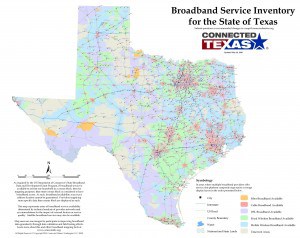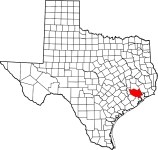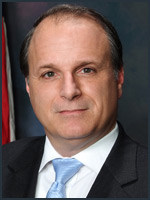Only in Texas.
Less than a day after the Texas Department of Agriculture unveiled its statewide broadband map, an opposition candidate running for the office of Agriculture Commissioner dismissed it as a re-election scheme that will never benefit rural Texas.
Hank Gilbert, the Democratic agriculture commissioner candidate, criticized the incumbent commissioner’s efforts as a cheap stunt that took four years to deliver and wasted taxpayer money.
“This is yet another stupid, sleazy, ‘look-at-me’ political trick designed to cover up the fact that he’s one of the best at wasting tax money in the history of the state,” Gilbert said. “That map will do nothing for people without broadband access. I’m sure people on landline modems will be grateful to Todd—after the 45 minutes it takes them to actually view the map to determine, sure enough, that their area isn’t served by broadband,” Gilbert continued.
Gilbert is referring to a joint broadband mapping project by the Texas Department of Agriculture and telecom industry front group Connected Nation, which is stacked to the rafters with telecom industry executives with a vested interest in making sure those maps reflect the industry’s interests.
Current commissioner Todd Staples released the map with great fanfare, claiming 97 percent of Texas already had access to broadband service, with just three percent, representing 250,000 Texans without. Those numbers were debatable, considering Connected Nation was involved. In earlier mapping efforts, the group claimed ubiquitous broadband was already available over large sections of several communities, even though it turned out many of those homes could not qualify to receive the DSL service the group said was available.
Gilbert put a less fine point on it:
“Aside from the fact that he considers the federal stimulus dollars for broadband an excuse to gain further name recognition, what has Todd Staples really done to increase broadband connectivity in Texas,” Gilbert asked. He also questioned why TDA officials have said publicly, in the weeks prior to the map’s unveiling, that they didn’t know what areas of Texas were not served by broadband or high-speed internet access.
“It is a sad day when the agency and commissioner in charge of making sure rural areas get broadband don’t know which areas are underserved. It’s even more sad that the TDA had to depend on a public-private partnership with a non-profit agency to figure it out. I don’t think it will come as a surprise to anyone that telecom companies have far more granular information on existing service areas,” Gilbert said.
“Based on the information available on the website Staples is touting, anyone with a pulse, vocal chords, and the ability to dial the keys on a telephone could have collected this information from providers. I don’t see why it has taken Todd Staples nearly four years to do this,” Gilbert said.
Gilbert is apparently new to the broadband availability debate. Telecom companies treat specifics about their broadband service areas and speeds as proprietary business information and will not disclose it to the government or any other third party, claiming it needs to protect the information for competitive reasons. Earlier efforts to collect this information in other states met with stonewalling from providers. Even the federal government has been unable to gather street-level statistics on broadband service from some providers.
But Gilbert has a point that a map project, especially with an industry front group in the mix, does not actually bring broadband to anyone. Too often, such maps are used to block would-be competitors from getting federal broadband grant money, with nearby providers claiming the maps show the funding would help a community already served by broadband, even if it was not. They also help paint a helpful picture for an industry seeking funding for middle-mile projects that divert broadband stimulus funding to help incumbent providers enhance their networks at the public expense. In short, Texas cable and phone companies get to argue the stimulus program is a waste of money (unless they are recipients) because Texas doesn’t have a broadband problem.
Cue the Texas Cable Association:
“The map shows that less than 1 percent of all Texans cannot access some form of broadband, whether, wired, wireless or mobile. Yet – without this information – the federal government awarded more than $200 million in grants and loans to projects in Texas. Some of these projects propose to duplicate service in an area already served by multiple broadband providers.
“In addition, the federal government set a deadline for second-round funding applications that forced the Texas Department of Agriculture to again make recommendations without the benefit of the mapping data.
“As the federal government considers these new applications, the Texas Cable Association urges it to make its decisions based on the new Texas broadband availability map.
“Taxpayer dollars – in the form of government grants – should not be used to duplicate services or to provide free capital that allows grant winners to gain market advantage over private companies that have invested millions of dollars of their own money to make broadband available.”
The state cable lobby even has a 30 second ad running, thanks to the help of the mother-of-all-astroturf groups, Broadband for America — a front group for big cable and phone companies.
[flv]http://www.phillipdampier.com/video/Texas Cable Association Broadband Ad.flv[/flv]
The Texas Cable Association has this not-too-subtle ad promoting private investment in broadband, suggesting Texas telecoms are helping, not hurting consumers and businesses. (30 seconds)
The Staples campaign responded to Gilbert’s accusations Texas-style — by accusing their opponent of being a crook.
Staples’ campaign manager Cody McGregor said:
“Our opponent has a criminal conviction for theft, unpaid taxes, current tax liens, and allegedly accepted a bribe for $150,000. I hope all Texans will gain access to the Internet and have the ability to view www.guiltyguiltygilbert.com and get the facts about our opponent and his campaign’s trouble with telling the truth.”
Staples’ website is way over the top, accusing Gilbert of being a “villainous Obama Democrat” who is guilty of not wearing his seatbelt and being stupid.
Todd Staples owns stock in at least two telecom companies, AT&T and Fairpoint Communications, the latter of which is probably not helping his portfolio too much considering it declared bankruptcy.
Read Gilbert’s “fact sheet” on Todd Staples’ broadband mapping project below the jump.
[flv width=”640″ height=”500″]http://www.phillipdampier.com/video/Repeat Offender Hank Gilbert.flv[/flv]
And you thought your state’s campaign ads were too negative. The Staples campaign goes back to the old west to drive home a message about their opponent. (1 minute)


 Subscribe
Subscribe








